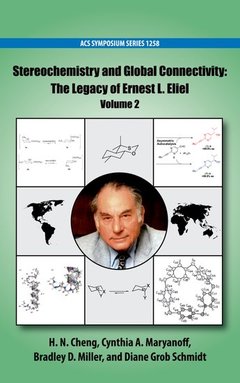Description
Stereochemistry and Global Connectivity
The Legacy of Ernest L. Eliel Volume 2
ACS Symposium Series
Coordinators: Cheng H.N., Maryanoff Cynthia A., Miller Bradley D., Schmidt Diane Grob
Language: English
Subject for Stereochemistry and Global Connectivity:
Publication date: 09-2018
240 p. · 16.2x23.7 cm · Hardback
240 p. · 16.2x23.7 cm · Hardback
Description
/li>Biography
/li>
A major strength of American Chemical Society (ACS) is the large number of volunteers who help to grow and sustain the organization, from local sections to technical divisions, from regional to national meetings, from task forces to national committees, and from conducting research to writing and reviewing manuscripts for journals. Some of them spend literally thousands of hours on behalf of ACS and the global chemistry enterprise, helping students or fellow scientists, organizing meetings and symposia, and reaching out to the local communities. One of the people who excelled in these efforts was the late Prof. Ernest L. Eliel. For many years he taught at the University of Notre Dame and the University of North Carolina and was an acknowledged leader in organic stereochemistry and conformational analysis. He was also a leader at ACS, serving as ACS President in 1992 and Chair of ACS Board of Directors in 1987-89. Unfortunately Prof. Eliel died in 2008, but the ACS held a symposium in 2016 honoring his work. This book features two volumes highlighting stereochemistry and global connectivity, which represent two of the key legacies of Prof. Eliel. Because stereochemistry is a fundamental chemistry concept, ongoing research is carried out in different subfields of chemistry (such as organic, medicinal, carbohydrates, polymers), using various analytical techniques (such as NMR, X-ray crystallography, and circular dichroism). The two volumes of this book contain many research papers that represent cutting-edge research in all the above areas. Because chemistry is now a world-wide enterprise, global connectivity is important to chemistry practitioners, and the chapters on international activities should be of great interest as well.
H. N. Cheng (Ph.D., University of Illinois) is currently a research chemist at Southern Regional Research Center of the U.S. Department of Agriculture in New Orleans, where he works on projects involving improved utilization of commodity agricultural materials, green chemistry, and polymer reactions. Over the years, his research interests have included green polymer chemistry, biocatalysis and enzymatic reactions, pulp and paper chemistry, functional foods, polymer characterization, and NMR spectroscopy. He is an ACS Fellow and a POLY Fellow and has authored or co-authored 230 papers, 25 patent publications, co-edited 16 books, and organized or co-organized 30 symposia at national ACS meetings since 2000. Cynthia A. Maryanoff (Ph.D., Princeton) is Foundation Distinguished Professor at the Baruch S. Blumberg Institute, in Doylestown, PA. She began her career in 1977 at Smith Kline & French Laboratories and joined Johnson & Johnson in 1981. She advanced through various Johnson & Johnson pharmaceutical units to the highest scientific position in the company. She retired from J&J in 2013. Her publication record includes more than 100 scientific papers, several books, and 67 U.S. or European patents. She is the recipient of numerous awards, including ACS Fellow, AAAS Fellow, the ACS Garvan-Olin Medal, the Earle B. Barnes Award for Leadership in Chemical Research Management, the Henry F. Whalen, Jr. Award for Business Development, and the Perkin Medal for outstanding work in applied chemistry from SCI. Bradley D. Miller (Ph.D., University of Arizona) is the Director of ACS International Activities. He has worked for ACS since 1999, developing programs, products, and services to advance chemical sciences through collaborations in Africa, Asia, Europe, Latin America and the Middle East. He works with ACS staff and different governance units to create opportunities for chemistry to address global challenges through in-person and web-based scientific network development, res
© 2024 LAVOISIER S.A.S.




